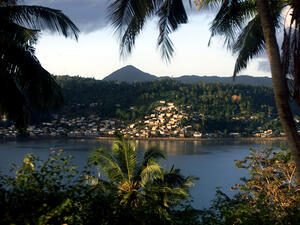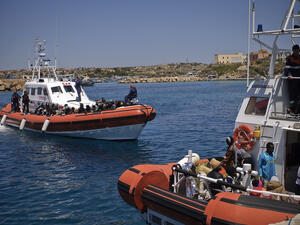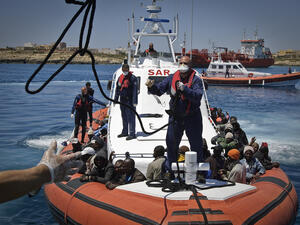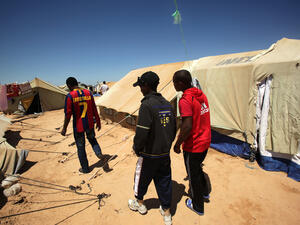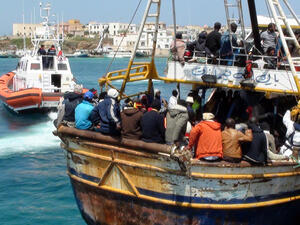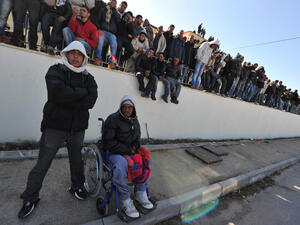International help needed to stop people-smuggling across Gulf of Aden
International help needed to stop people-smuggling across Gulf of Aden
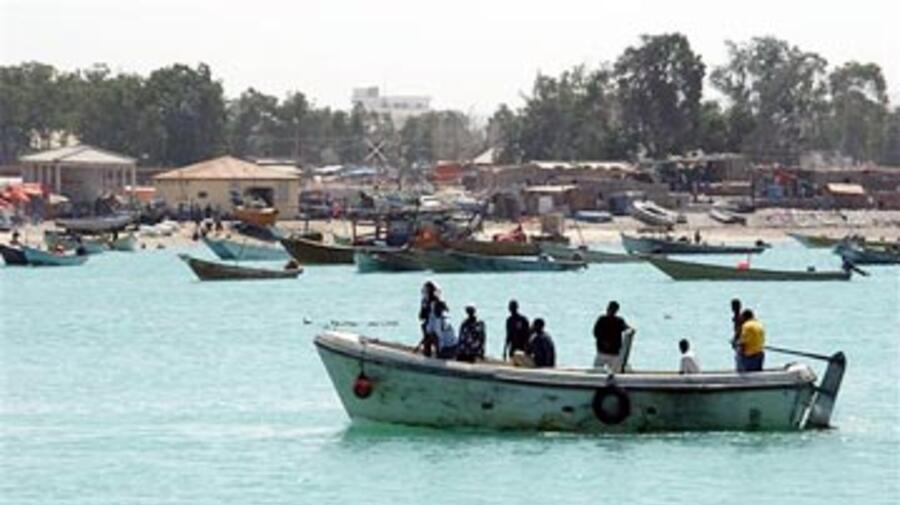
Small fishing boats, like this one in Bossaso's busy commercial port, carry up to 125 people when used to smuggle migrants from the Somali coast across the Gulf of Aden to Yemen. Smugglers charge $30 to $50 and sometimes throw their passengers out to swim as they near the Yemeni shore.
BOSSASO, Somalia, Feb. 14, (UNHCR) - Deer, a strikingly beautiful Somali girl of about 10, lies on a striped plastic sheet on the ground inside a large tent, staring blankly ahead and barely registering the many people gathered around her.
In shock and dehydrated, she's just been rescued - along with about 125 others - after eight days adrift in the Gulf of Aden in a tiny fishing boat. Their desperate journey to what they hoped would be a land of better opportunities has brought them right back to the north-eastern Somalia coast.
Most of them, anyway. After a week at sea with no food and water, under an unrelenting sun, people on the overcrowded open boat began to go mad, survivors say. Deer's uncle, with whom she was travelling, handed her over to a woman on the boat and threw himself into the sea, vowing to swim to shore - perhaps days away - for help. He hasn't been seen since and is presumed to be one of the hundreds who drown every year on this perilous voyage to Yemen.
"It's not true, he's just in the hospital," protests Deer, briefly rousing herself.
"That's what we're letting her think," another survivor, an older woman, says quietly, turning away so as not to upset Deer.
Bossaso is not only the chief commercial port of Puntland, a self-declared autonomous area in north-east Somalia, but also one of the world's busiest smuggling hubs. Guns, cigarettes and drugs come in; people go out. For at least three years, thousands of Somalis, and increasingly, Ethiopians, have set off from the coastline in tiny open fishing boats hoping to reach Yemen. From there many hope to move on to work illegally in Saudi Arabia, which looms large in the local imagination as a land of riches. (Once in Yemen, some Somalis register with UNHCR as refugees, but many more are economic migrants.)
All too often the boats capsize. Even if they make the trip successfully, smugglers often beat the passengers to force them to jump overboard as they near the coast, even though few can swim. The passengers, mostly young men and women between the ages of 15 and 30, often include children as well.
Asho Ibrahim Hassan, 28, is another of the 16 survivors brought with Deer to one of UNICEF's (the United Nations Children's Fund) tent classrooms after their rescue at sea by an American boat. Though clearly still somewhat dazed, she manages to tell the story of their misadventure coherently.
Their boat, like so many others that leave the Puntland coast every week, set out dramatically overloaded with 125 people, Somalis and Ethiopians, "in search of a better life and employment," says Asho through lips swollen from sunburn.
She was desperate to get back to Yemen, where she had worked for 10 years before being deported. She had her one-year-old son in tow, eager to be reunited with his father, who is still in Yemen. She had paid the equivalent of $33 U.S. dollars (a large sum here) to the people smugglers who run the boats.
"The engine failed on the first day out and we drifted for seven more days," Asho says. The smugglers, who run a well-organized operation, strictly limit the amount of food and water each passenger can bring on what is supposed to be a journey of 36-48 hours.
With no food, water or protection from the sun, "I was in a very, very bad condition," Asho says simply. "I was crying, but Allah saved us. It was something I cannot describe."
The precise details of what happened on Asho's boat are - perhaps deliberately - a bit unclear. But the adults among these 16 survivors agree that the boat's captain also ended up drowning, perhaps thrown overboard by his outraged customers.
"Then the Americans rescued us and the crew was wonderful," Asho says. "They provided us tents and food and water."
Despite the well-publicized dangers of the smuggler's boats, Somalis and Ethiopians in the thousands continue to risk their lives. From the accounts of their customers, the traffickers have a smooth, professional network, recruiting customers with promises of an easy life in Yemen or Saudi Arabia, and using radio communications to signal each other when a new "batch" of customers is on the way.
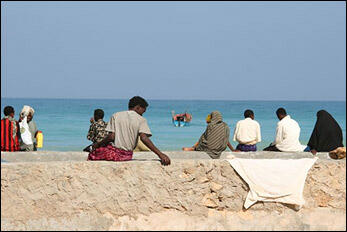
At Mareero, near Bossaso, Puntland, customers who have paid $30 to $40 to people smugglers wait for night to fall so they can board the boat that they hope will take them across the Gulf of Aden to Yemen and a better life.
Most of the customers seem to be from lawless central and southern Somalia, with an increasing number coming from Ethiopia. They come by truck and by foot, travelling up to 15 days to reach Bossaso, a journey fraught with its own dangers. Customers are often cheated along the way by smugglers who take their money but don't move them on as agreed.
Within two days, three separate Ethiopians told UNHCR staff in Puntland that they were robbed of all their money outside Burao, a town in Somaliland on their route. Many end up sleeping on the streets of Bossaso, working odd jobs and trying desperately once again to get the $30 to $50 together to pay their boat passage.
Some women end up as prostitutes, or are raped by the smugglers, militiamen or fellow travellers. One recent morning in the cliffs at Mareero, a departure point 14 km east of Bossaso, customers waiting to board the boat that night said four women had been raped the night before by armed men in uniform. Sometimes the smugglers take their customers out to sea for a day or so, circle around and dump them back on the Somalia coast, claiming they have reached Yemen.
Despite everything, the hazardous trip across the Gulf of Aden is almost a commute for some. One 30-year-old Somali man waiting for a boat at Mareero said he had made the crossing to Yemen nine times. Deported just as many times, he was waiting for his tenth voyage.
UN High Commissioner for Refugees António Guterres has called for international action to stem the flow of desperate people. "The international community has to help - and put pressure on - local authorities in Puntland and Bossaso to crack down on the smugglers," he said last September.
So far, though, any efforts to discourage the human trafficking have resulted only in pushing the departure points out of town, up and down the coast east and west of Bossaso. Qaw, 35 km west of Bossaso, has become such a well-known departure point that one entrepreneur has set up a small shop there, selling soft drinks, cookies, spaghetti, tomato sauce, plastic shoes and razor blades.
Col. Aidid Ahmed Nur, divisional police commander for Bossaso, knows about Qaw also, but says he doesn't have cars or fuel to send policemen out there to discourage the departures.
"We need the international community's support," agrees Bossaso mayor Khadar Abdi Haji. "The government doesn't have any boats. If we get enough support for the police, we believe we can stop this traffic on the coast."
Just how much money does Puntland need to stop the traffic? "If you pay us, we will prepare a full budget," police commander Col Aidid says obligingly.
In the absence of an official crackdown, a local non-governmental organization, the Somali Reunification Women's Union (SRWU), is doing all it can to try to stop customers from getting on the boats
But Abdullahi Dahir Hagi, programme officer for SRWU, knows he is battling desperation and fatalism, both of which impel so many young men and women to undertake what they know in advance will be a dangerous, harrowing journey.
Abdullahi carries with him a sheaf of photos of dead bodies that washed up on the Yemen coast last month after two smugglers' boats capsized. He shows the gruesome photos to anyone he suspects is headed for the open sea.
"It's a life-saving measure," he says. "Everybody who is going to pay his money to die, we want to show him the pictures to discourage him. Everybody who sees these pictures will immediately take a decision to stay and work in Bossaso instead of getting on the boat to Yemen."
Abdullahi's confidence seems borne out one morning in the desert south of Bossaso when he encounters a group of nine men - mostly 18 or 19 years old - from Jowhar (south Somalia), headed for Bossaso to earn money for the illegal passage to Yemen.
One of the travellers, Abdurahman Adil, 23, makes loud sounds of dismay as he examines the shocking images. Visibly shaken, he turns away and circles around as if he is about to throw up. Then he sinks to the ground and, crouching there, says quietly: "I'm not going to go."
But one of his fellow travellers, Abdulkadir Osman, 28, is full of bravado. "It's our luck whether we die or live," he shouts out.
But a few minutes later he is with the majority: "We will stay in Bossaso," they say soberly. "We will not get on the boats."
If they did indeed change their minds, they are in a minority. Back among the survivors in the UNICEF tent, Asho says she will devote herself to warning others of the dangers on the smugglers' boats.
But she doubts it will have much effect. "Everybody knows the risks," she says, "but they go anyway because they are in search of a better life."
By Kitty McKinsey in Puntland, Somalia


